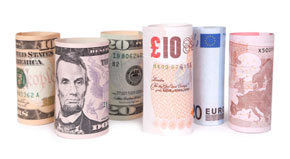
image courtesy unibank.com
A number of non-Nigerians wonder about the average Nigerian’s “fascination” with foreign exchange (FX) rates, and how when these figures sneeze (change), the entire Nigerian economic and financial systems seem to catch a cold. Many Nigerians do not understand why this number currently seems to be in freefall, and I have heard a number of conspiracy theories related to this phenomenon.
To make sense of all this, let us try to understand what a foreign exchange rate, commonly referred to as “exchange rate” really is.
The xZoller
There is a product called the xZoller. xZollers are used to purchase products and services from other countries. Anyone leaving the shores of Nigeria has to purchase some xZollers to enable them conduct transactions in the other countries they visit. xZollers are also what anyone selling products and / or services to customers in other countries would receive. xZollers are a pretty neat nearly-essential commodity :).
Sellers
Nigerians and companies in Nigeria have a number of products that they sell to people and companies in other countries (i.e. exports), with the most notable being crude oil. In exchange for these exports, we receive xZollers. This means that private individuals, private companies, and the Federal Government of Nigeria (FGN) receive xZollers in exchange for their respective export trades; FGN also receives xZollers from some of its tax receipts. FGN’s xZoller earnings are collected on its behalf by the Central Bank of Nigeria (CBN). So, the CBN and other Nigerian entities in the export business receive xZollers as a part of their everyday business activities, hence are potential sellers of xZollers.
There is another major route through which xZollers make their way into the Nigerian economy: remittances from members of the diaspora. When Nimi – a young Nigerian woman who has recently resumed her new job in Boston, Massachusetts in the United States after completing her university program at Harvard – sends some cash to her mum in Ibadan, Oyo in Nigeria through her cousin who came to visit, she is remitting xZollers to her mum, making Nimi’s mum a potential xZoller seller as well.
Buyers
As mentioned earlier, anyone who needs to purchase goods and / or services from any entity domiciled outside Nigeria will need to obtain xZollers to complete the transaction. So,
- Gbenga, who is in school in Toronto, Canada, will need to obtain xZollers to pay his school fees.
- Zainab, who owns a manufacturing plant that requires a particular raw material that she obtains from Sydney, Australia, will need to obtain xZollers to pay her Australian suppliers.
- Adamu, who purchases cars from a car manufacturer in Tokyo, Japan for resale in Lagos, Nigeria, needs to obtain xZollers to pay the car manufacturer.
- Temi, who buys her office shirts from stores in London, UK, will need to obtain xZollers to pay the retail stores.
As we can deduce, there a lot of potential xZoller buyers.
Exchange Rate
Any of these potential xZoller sellers cannot transact business within Nigeria with their xZollers as the legal tender in Nigeria is the Nigerian Naira. So, when the FGN wants to pay the salaries of the federal civil service workers, or Nimi’s mum wants to buy groceries for the house, they will need to find people who would like to acquire some xZollers by parting with some Nigerian Naira. The seller and buyer would agree on how many Nigerian Naira will be exchanged for each xZoller, and this is what is called the exchange rate.
Now that we know what an exchange rate is, how it is derived, and some of the participants in the FX market, we are ready to delve into the mechanics of Nigeria’s FX markets (Part II), as well as the reason why their colds seem to impact Nigerians and the Nigerian economy so severely (Part III). Do note that xZoller is being used here to represent primarily the U.S. Dollar, but it could also be any other internationally traded currency, like the British Pound or the Japanese Yen.
Any questions or comments would be most appreciated, and can be provided in the box below or sent to comments@finomics101.com.
Until next week when Part II comes your way, keep safe, and remember not to spend it all in December :).
Pingback: Much Ado About FX (Part II of III): Nigeria’s FX Market Mechanics | Finomics 101
Pingback: Much Ado About FX (Part III of III): Why Does It Matter? | Finomics 101
Beautiful and very educative analysis, well done . Looking forward to reading the part 2.
LikeLiked by 1 person
Thank you.
Parts II and III have already been published:
LikeLike